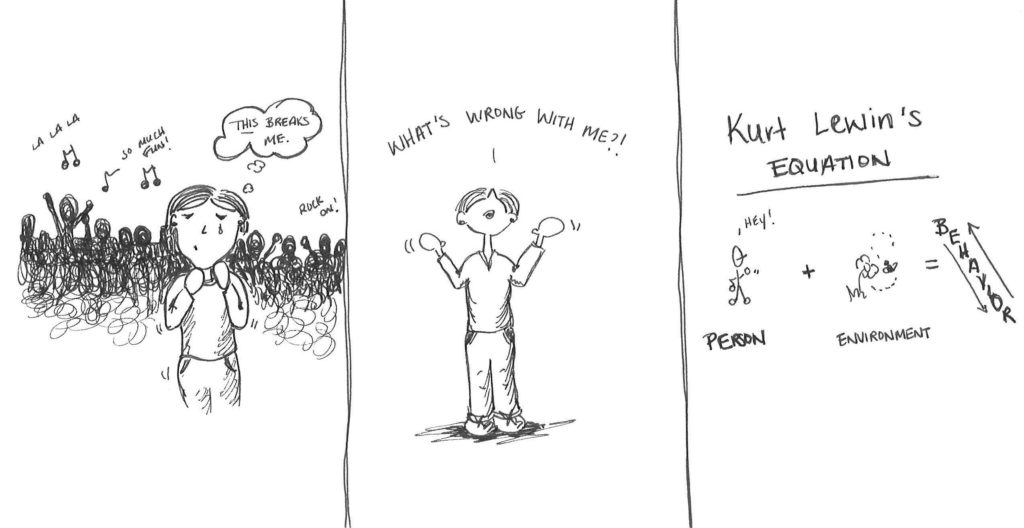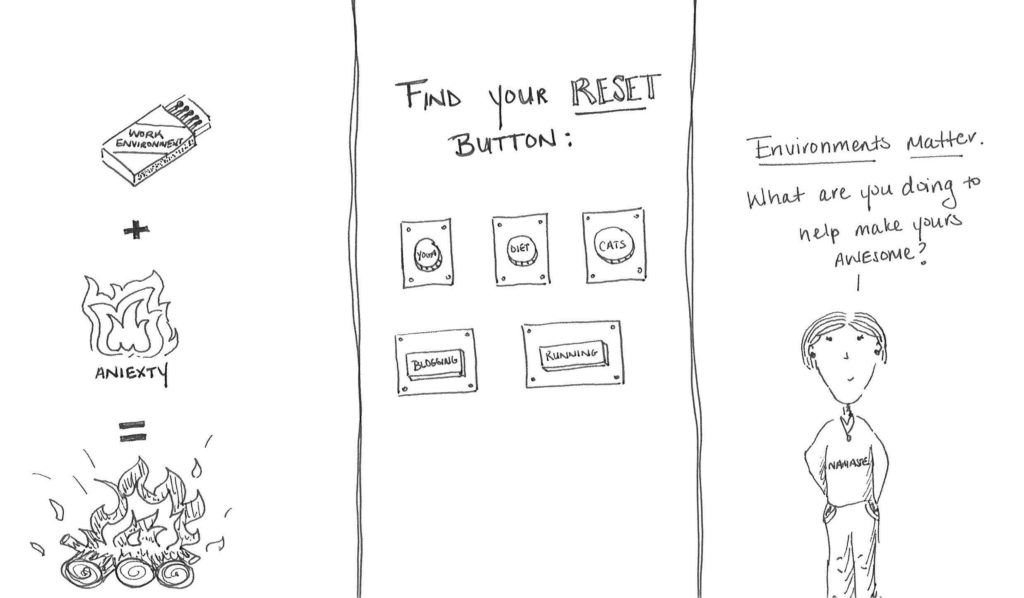by Renee Dowdy
In November I shared a post, What Breaks You, where I wrote about being at a concert with my husband at The Vic in Chicago seeing the Old 97’s (feeling like I’m out of a scene from The Breakup – epic, right?!). I began to panic about having cell phone reception in the theater. Staff in my department expected that I respond to my residential communities 24/7 during the academic year. I kept looking at my work phone, and that’s when the panic came over me like a tidal wave. What if I miss a call? Why can’t I do this job right? Why can’t I seem to do anything right? Why was I hired to do this if I am completely incapable? Were my past six years in residence life just easy – is this the real hard work and I’m failing at it? I’m a failure. An absolute mess. I’m unreliable. I don’t have my shit together…and the negative thoughts poured on and on until the music faded in my mind, and all I saw was the stage in blurry lights as tears fell uncontrollably. I couldn’t get it back together. My husband and I left the concert early. And there I was with more guilt, feeling like I couldn’t be at the concert and enjoy an evening out with my husband, but I most certainly did not want to be home. And there it was: trapped, seemingly with no escape, not even within my own mind.
It felt embarrassing to even admit what felt like weakness, let alone how pervasive and damaging my anxiety had become. It was difficult to manage because the constant thought I had was, “What’s wrong with me?” While I knew I had people I could talk to, it felt like there was no one I could trust with this burden. After all, aren’t everyone’s jobs difficult? Isn’t everyone busy? Isn’t everyone chronically overwhelmed to the point it invades every other facet of life? Well, the answer is not yes or no, but really the impact of anxiety.

I remember vividly beginning grad school and sitting in orientation sessions with other new CSP grads eager to crack open textbooks and begin classes. One of the faculty shared with us, “In grad school there are three things in your life: your assistantship, your coursework, and everything else. Only two of those will be going well at any given point in time.” Her point was taken, and that is where I took up my torch to carry, as I would be damned if my work suffered.
Something we know as student affairs practitioners is Kurt Lewin’s infamous equation: that B = f(P, E) or more simply put, our behavior is the function of us as a person and our environment. What I discovered is that the issue in the equation, the source of this behavior change, was not me as a person; it was my environment. While it was one that supported ideal behaviors for many, it was one that met my perfect combination of neurotic and over-achieving in a particularly inflammatory way. It was fuel to my anxiety flame.
In my experience with counseling, it was about finding a reset button for myself to identify triggers, recognize coping mechanisms, and also put in place preventative practices that allow me to be my best self. For my situation, I worked with a counselor to find ways to choose behaviors, foods, and physical activity to keep anxious thoughts and behaviors at bay. These improvements have been a journey, but I’ve found the benefits to far outweigh any opportunity cost. While I had preached to staff for many years that if you’re not taking care of yourself, you’re not able to take care of others, I had to experience it myself to make some necessary lifestyle changes. I found my reset button.
Some aspects of mental health management are within our control, but work has a major impact of our view of who we are, our satisfaction with our lives, and our ability to feel well. For those familiar with Wellbeing, of the five facets Gallup measures, career has the biggest impact on all of our other areas of wellness. Meaning, you can be thriving in your community, your relationships, your finances, your physical health, but if your career wellbeing is not in place, the rest will likely pale in comparison. The impact of a stressful work environment where one does not feel engaged or contributing not only leads to an employee feeling disengaged, but it creates a level of mental stress that is worse than prolonged unemployment. Individuals on the front lines and further down the business hierarchy actually feel this impact at a greater intensity than those leading from the top. We have a responsibility to care for the health and wellness of our employees because our jobs are killing us. Literally.

Our work environments have the ability to bring out the best of us…and the worst.One of the most high-impact ways to influence employee wellness and career satisfaction is to be able to give employees a sense of control. This is an extension of trust and an actionable item that very few of the general “us” in student affairs work to cultivate. When you feel a sense of control in your career, you are provided a sense of calm in your life, and you come to work not afraid of what’s happening within your own work environment. What frustrated me about trying to navigate my experiences with anxiety was not the fact that I had the anxiety but the fact that an environment can bring out a part of you that you thought was managed. That an environment can turn things so upside down that it feels as though there is no space to hit reset, to recalibrate, to find another way that works. And as we all know working with colleges and universities, we intentionally design environments on the daily. Environments matter. How often do we put intention into creating work environments and consider the impact not only on students but on employees?
Whatever your experience is, we all deserve to work in a space where we can contribute our best work and our best selves. It’s good for your health, it’s good for those you work around, and frankly, it’s good for business. I encourage you to know your triggers that create stress, that send you off-course, that keep you awake at night, that take away your focus, that lead you to a mental health deficit. Find your reset button. Know what resources help you care for yourself in the best way possible and hold to it. Treat it as a personal prescription that you commit to not allowing yourself to neglect and take as instructed. The work will be there tomorrow and we want you to be there, too.
Resources:
Lewin’s Equation
Wellbeing – Tom Rath and Jim Harter
Leaders Eat Last – Simon Sinek
Effects of Work Stress on Ambulatory, Blood Pressure, Heart Rate, and Heart Rate Variability – Tanja G.M. Vrijkotte, Lorenz J.P. van Doornen, Eco J.C. de Geus
The Business Case for Wellbeing – Gallup
Originally posted at the Student Affairs Collective on May 30, 2014.
